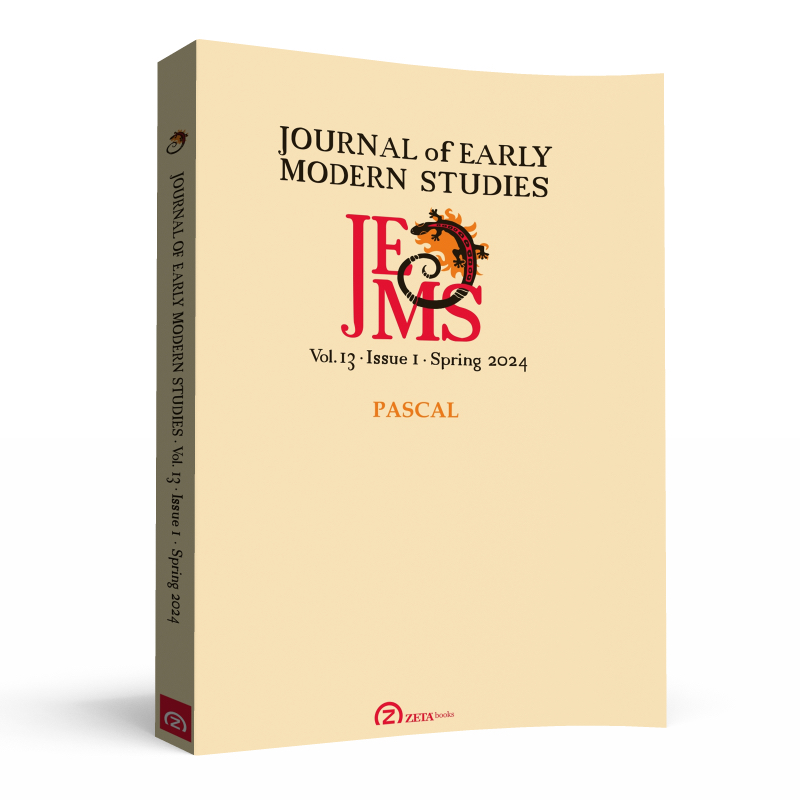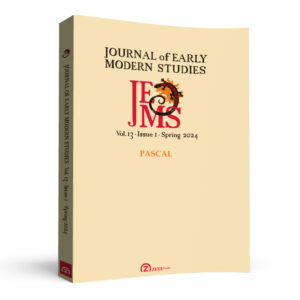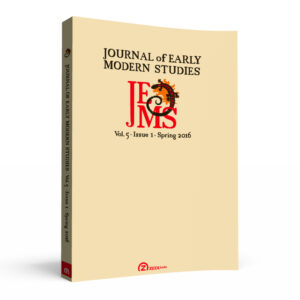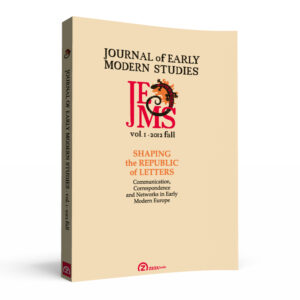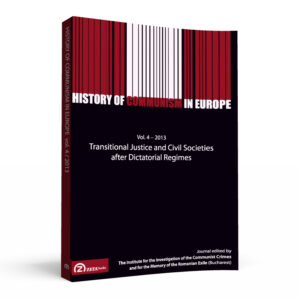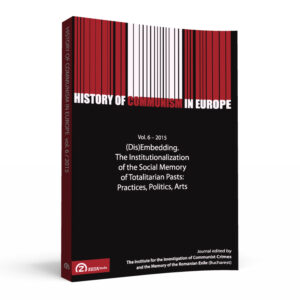Journal of Early Modern Studies, Volume 13, issue 1 (Spring 2024)
ISSN: 2285-6382 (paperback) / ISSN: 2286-0290 (electronic)
CONTENTS
Articles:
VLAD ALEXANDRESCU: Les deux manuscrits de L’Art de persuader de Pascal
Abstract: This study analyses the manuscript tradition of Pascal’s work now known as De l’art de persuader and offers a historical, textual and conceptual criticism of the decisions that led to the privileging of one source (the P’ manuscript) over another (the M manuscript and the D printed version) in the editorial history of the text. On the basis of this critique, the author formulates new genetic hypotheses and justifies the probity of the M copy for the establishment of the text of De L’art de persuader that can lead towards a general interpretation of Pascalian epistemology.
THOMAS BELLON: L’art de persuader et les règles de la méthode chez Pascal
Abstract: In this study, we attempt to show how the “art of persuasion” delivers a new conception of method, one that makes it possible to resolve the practical problems imposed by grounding truth in evidence alone. In this way, we show that the different determinations of the art of persuasion that run through the eponymous text, describe the various modalities of a single doctrine of persuasion that substitutes the precept of evidence – without denying it – for the need to define and demonstrate principles.
ALBERTO FRIGO: Il faut savoir désespérer où il faut. Pascal et le désespoir de la philosophie
Abstract: Whether it’s a question of “human philosophy” or of the Christian understanding of action in a regime of efficacious grace, for Pascal despair is always the effect of an error of appreciation. We overestimate our misery and powerlessness, we make them the whole of our being and our action, and so we consider ourselves only miserable and totally powerless. Despair should therefore be prevented and neutralised when it takes hold of the soul, never advocated or fed. Never – except perhaps in one case, and it is this case that we would like to address in this paper. A case that is all the more paradoxical because it is precisely in its proper place, where it is opportune and necessary, that despair appears difficult if not almost impossible to produce.
TAMÁS PAVLOVITS: Unitatis amatrix natura. Le problème de l’unité chez Pascal
Abstract: This study aims to clarify the relationship between nature and God in Pascalian thought. This relationship is based on the concept of unity. In a letter of 1648, Pascal wrote that God is present in nature through the ontological and formal unity of things which represents perfect divine unity. A few years later, through his mathematical research, Pascal discovered the principle of double infinity which he considered to be the essential attribute of nature. The unity of nature is defined as the omnipresence of double infinity in nature. However, these two interpretations of unity are mutually exclusive because double infinity destroys all ontological and formal unity in things. The question is how Pascal maintains the relationship between nature and God if the principle of double infinity destroys formal unity in nature. The paper argues that the presence of the double infinite in nature does not destroy the relationship of resemblance and representation between nature and God but makes it more complex. The double infinite does not represent God in nature directly but is inscribed in things as the image of the hidden God.
SYLVAIN JOSSET: Heart, Intelligence and Intuitus: Arnauld and Nicole, Cartesian Interpreters of Pascal
Abstract: In a famous fragment of the Pensées, Pascal explains that it is through the heart that we know first principles. But what is the meaning of this knowledge? The editors of Port-Royal took the radical decision to replace the occurrences of “heart” in this fragment with the expression “feeling and intelligence [sentiment et intelligence]”, thus marking the equivalence of these two notions. However, given that Pascal contrasts the heart with reason, and that intelligence is, for both Pascal and Descartes, synonymous with reason, how are we to understand this modification? Some commentators have seen it as an absurdity, proving that it could not have been made by interpreters like Arnauld and Nicole. In this article, I first show, on the contrary, that it is precisely a chapter of the second edition of The Logic of Port-Royal that offers the key to the difficulty. While Arnauld and Nicole are faithful to the Cartesian synonymy of intelligence and reason everywhere else, in this chapter they distinguish between these two notions, taking Descartes’ distinction between intuitus and reason from the Rules for the Direction of the Mind. Secondly, I contest this interpretation of the Pascalian heart: the heart, as an originally passive capacity of feeling, differs from the Cartesian intuitus.
YOEN QIAN-LAURENT: Walk the Line. Pascal on Meaning, Rules and Skepticism
Abstract: The relation of Pascal’s philosophy to language is well-known. Pascal’s rhetorical considerations, his reflections on the language of “honnêteté,” and the analysis of definition in De l’Esprit géométrique have been the focus of many commentaries. But these texts remain relatively undetermined in their epistemological dimension, and, especially, in the context of a more abstract reflection on the nature of meaning, truth, and language. In this article, I show how Pascal’s reflection is confronted with a particular challenge regarding the meaning of words and uncertainty. This problem can be restated with the help of the concept of rule and involves our ability to assess what it means to follow a rule. I trace Pascal’s evolution in the face of this problem, adopting successively a dogmatist position, a skeptical position and finally a contextualist position in three different texts where this challenge emerges. This development underlines the sense in which Pascal’s pragmatism is a fundamental principle of his thinking about human knowledge and how it should be addressed by philosophers.
JEAN DHOMBRES: Sur les interprétations de « tout un autre côté » de Pascal
Abstract: In 1696, in the Preface to the Analyse des infiniment petits pour l’intelligence des lignes courbes, L’Hôpital wrote, “As for Mr. Pascal, he turned his views completely to another side: he examined the curves themselves.” Through the examination of this “completely different side,” this article confronts the various possible meanings of a legacy that has been overlooked until today, notably during the Enlightenment era but also at the beginning of the 20th century, in the mathematical realm of infinity applied to the study of curves.
Reviews
JEAN-CÔME CHALAMON
Vincent Carraud, Pascal: de la certitude, Paris, PUF, « Épiméthée », 2023.
THOMAS BELLON
João F. N. B. Cortese, Infini et disproportion chez Pascal, Honoré Champion, Paris, « Lumière classique », 2023.
RUXANDRA VIȘAN
Laetitia Sansonetti and Rémi Vuillemin (eds.), Language Commonality and Literary Communities in Early Modern England: Translation, Transmission, Transfer, series Polyglot Encounters in Early Modern Britain, vol. 1, Turnhout: Brepols, 2022.

